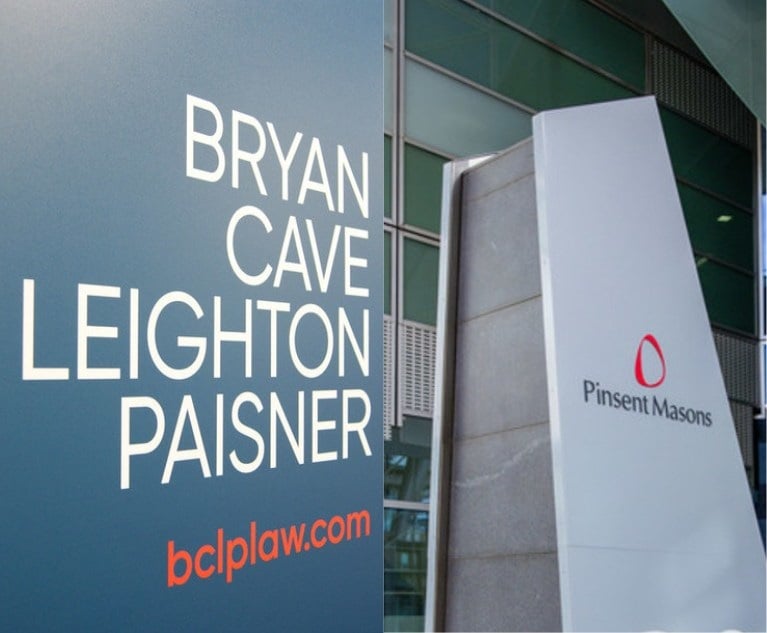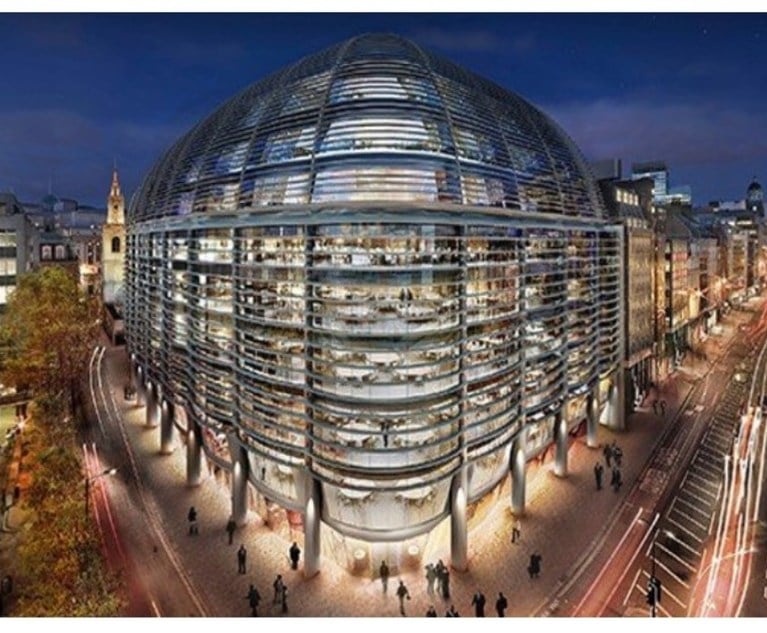CC Leapfrogs Up UK M&A Rankings as Kirkland Dominates European Table
Deal volumes continue to drop, with the U.K. and Europe seeing their lowest half-year volumes since 2013.
July 04, 2019 at 04:45 AM
5 minute read

Clifford Chance has taken the top spot for the total value of U.K. M&A deals in the first half of 2019, in a slower year for big deals.
According to Mergermarket data on deal values and volumes for the first half of 2019 (H1), CC worked on 28 deals worth a total of $26.9 billion, rising six places up the table to topple last year's leader Freshfields Bruckhaus Deringer, which dropped to fourth place.
Freshfields also saw its European fortunes fade, tumbling to eighth place after having topped the European deal value rankings in H1 2018.
CC co-head of London corporate Melissa Fogarty said CC had "seen a lot more interest in private equity firms taking public companies private", citing its involvement in the £6 billion take-private acquisition of Alton Towers owner Merlin Entertainments as an example of this trend.
Kirkland & Ellis rose 12 places in the U.K. rankings to take second place, having worked on 40 deals worth $25.6 billion in H1.
Completing the top five U.K. line-up for deal value are Slaughter and May ($25.4 billion), Freshfields Bruckhaus Deringer ($23.7 billion) and Latham & Watkins ($22.9 billion).
The rankings come against a backdrop of dwindling deal numbers in H1, with the total number of European deals involving the top 20 performers dropping to 3,223 – the lowest count since 2013.
Similarly, U.K. deal volumes dropped to 605; in H1 2018, the figure stood at 810.
CC's Fogarty added: "Though some of the macroeconomic issues are no doubt suppressing volumes, there is still an appetite from financial investors to buy into favourable assets. So it isn't as negative a picture as one might have expected, considering the huge macroeconomic uncertainties that still exist in the market."
Freshfields' London M&A practice co-head Piers Prichard Jones said: "In the U.K. and Europe, there have been a number of instances where regulators have intervened and either blocked deals or imposed regimes. I think you're seeing a more interventionalist regime across the region. The risks associated with these deals means that clients may not want to take the plunge."
He added that a thinning M&A market, which follows a spate of mega-deals in the first half of last year, has meant that fewer deals are actually being completed.
He said that while the firm's pipeline is strong, "the question mark is [over] how much of that pipeline will convert into deals".
Matthew Elliott, a corporate partner in Kirkland & Ellis's London office, said: "Fierce competition for good assets is generally impacting the volume of transactions. The macro environment has created some uncertainty in the U.K. but that, of itself, has created opportunity [that] we see subsisting in the short term. The consistent challenge is remaining flexible enough to adapt to market demands as they evolve."
Kirkland also topped the European tables for deal value in H1, surging 22 places to take first place ahead of fellow elite firms Davis Polk & Wardwell and Slaughter and May, having advised on 78 deals worth $160.3 billion.
Davis Polk & Wardwell took second place in the European rankings, having worked on significantly fewer deals than Kirkland (22) but with a combined value of $129.5 billion.
DLA Piper worked on the largest number of European deals, taking on 130 mandates worth $6.8 billion, with CMS in second place with 121 deals worth $14.1 billion. The two firms switched places in the U.K. rankings, with CMS working on 43 deals worth $8.8 billion and DLA working on 42 deals worth $1.8 billion.
Bob Bishop, global co-chair of corporate at DLA Piper, said: "The natural fact is that we have been in a very buoyant market for a relatively long period of time. Those markets don't continue unabated. Bull runs turn into bear runs at some point.
"We've seen the fragility in the market in the U.K. I think people who are investing from abroad are waiting to see what the outcome of Brexit is going to be; some of what might happen with Brexit has been priced into transactions, but not all of it. There is some concern among investors about investing in an uncertain future.
"Without Brexit, it would be a much more buoyant picture."
He added that the risk of increasing interest prices will make a difference to companies that are used to borrowing at lower levels and "may not be planning for the environment where those levels might go up", but that cheap debt and a lot of dry powder have been drivers for activity.
Despite mixed fortunes in the U.K. and Europe, global deal values rose slightly on last year's figures, with a combined deal value tallying $1.8 trillion in H1.
This content has been archived. It is available through our partners, LexisNexis® and Bloomberg Law.
To view this content, please continue to their sites.
Not a Lexis Subscriber?
Subscribe Now
Not a Bloomberg Law Subscriber?
Subscribe Now
NOT FOR REPRINT
© 2025 ALM Global, LLC, All Rights Reserved. Request academic re-use from www.copyright.com. All other uses, submit a request to [email protected]. For more information visit Asset & Logo Licensing.
You Might Like
View All
A&O Shearman, Cleary Gottlieb Act on $700M Dunlop Tire Brand Sale to Japan's Sumitomo


Stewarts and DAC Beachcroft Lead on £2B Leicester City Helicopter Crash Litigation

Israel's Rushed Corporate Tax May Spark Law Firm Mergers, Boost Large Firms Including Gornitzky
4 minute readTrending Stories
- 1JCPenney Customer's Slip-and-Fall From Bodily Substance Suit Best Left for a Jury to Decide, Judge Rules
- 2Products Liability: The Absence of Other Similar Claims—a Defense or a Misleading Effort to Sway a Jury?
- 3529 Accounts Are Not Your Divorce Piggybank
- 4Meta Hires Litigation Strategy Chief, Tapping King & Spalding Partner Who Was Senior DOJ Official in First Trump Term
- 5Courts Beginning to Set Standards for Evidence Relying upon Artificial Intelligence
Who Got The Work
Michael G. Bongiorno, Andrew Scott Dulberg and Elizabeth E. Driscoll from Wilmer Cutler Pickering Hale and Dorr have stepped in to represent Symbotic Inc., an A.I.-enabled technology platform that focuses on increasing supply chain efficiency, and other defendants in a pending shareholder derivative lawsuit. The case, filed Oct. 2 in Massachusetts District Court by the Brown Law Firm on behalf of Stephen Austen, accuses certain officers and directors of misleading investors in regard to Symbotic's potential for margin growth by failing to disclose that the company was not equipped to timely deploy its systems or manage expenses through project delays. The case, assigned to U.S. District Judge Nathaniel M. Gorton, is 1:24-cv-12522, Austen v. Cohen et al.
Who Got The Work
Edmund Polubinski and Marie Killmond of Davis Polk & Wardwell have entered appearances for data platform software development company MongoDB and other defendants in a pending shareholder derivative lawsuit. The action, filed Oct. 7 in New York Southern District Court by the Brown Law Firm, accuses the company's directors and/or officers of falsely expressing confidence in the company’s restructuring of its sales incentive plan and downplaying the severity of decreases in its upfront commitments. The case is 1:24-cv-07594, Roy v. Ittycheria et al.
Who Got The Work
Amy O. Bruchs and Kurt F. Ellison of Michael Best & Friedrich have entered appearances for Epic Systems Corp. in a pending employment discrimination lawsuit. The suit was filed Sept. 7 in Wisconsin Western District Court by Levine Eisberner LLC and Siri & Glimstad on behalf of a project manager who claims that he was wrongfully terminated after applying for a religious exemption to the defendant's COVID-19 vaccine mandate. The case, assigned to U.S. Magistrate Judge Anita Marie Boor, is 3:24-cv-00630, Secker, Nathan v. Epic Systems Corporation.
Who Got The Work
David X. Sullivan, Thomas J. Finn and Gregory A. Hall from McCarter & English have entered appearances for Sunrun Installation Services in a pending civil rights lawsuit. The complaint was filed Sept. 4 in Connecticut District Court by attorney Robert M. Berke on behalf of former employee George Edward Steins, who was arrested and charged with employing an unregistered home improvement salesperson. The complaint alleges that had Sunrun informed the Connecticut Department of Consumer Protection that the plaintiff's employment had ended in 2017 and that he no longer held Sunrun's home improvement contractor license, he would not have been hit with charges, which were dismissed in May 2024. The case, assigned to U.S. District Judge Jeffrey A. Meyer, is 3:24-cv-01423, Steins v. Sunrun, Inc. et al.
Who Got The Work
Greenberg Traurig shareholder Joshua L. Raskin has entered an appearance for boohoo.com UK Ltd. in a pending patent infringement lawsuit. The suit, filed Sept. 3 in Texas Eastern District Court by Rozier Hardt McDonough on behalf of Alto Dynamics, asserts five patents related to an online shopping platform. The case, assigned to U.S. District Judge Rodney Gilstrap, is 2:24-cv-00719, Alto Dynamics, LLC v. boohoo.com UK Limited.
Featured Firms
Law Offices of Gary Martin Hays & Associates, P.C.
(470) 294-1674
Law Offices of Mark E. Salomone
(857) 444-6468
Smith & Hassler
(713) 739-1250








